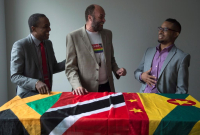Support strong Canadian climate journalism for 2025
Dr. Mark Wainberg was remembered Wednesday by Canadian LGBT activists and fellow scientists as a groundbreaking HIV researcher and passionate advocate for people living with the disease.
The 71-year-old Wainberg, director of the McGill University AIDS Centre, drowned Tuesday afternoon in Florida while swimming with his son in rough waters off Bal Harbour, Fla.
Linda Farha — president of the Farha Foundation, a Montreal-based HIV/AIDS research fundraising organization — said Wainberg was "enormous" in his field.
He was one of the doctors who helped her brother, Ron Farha, who founded the organization before he died of the disease.
"Dr. Wainberg was very present in Ron's life and was a shining light for my brother," she told The Canadian Press. "He hoped that something would happen one day. That he would find a cure."
Farha said Wainberg was part of the medical team that discovered the first antiviral drug to treat patients with the human immunodeficiency virus, or HIV.
"He played such a big role on so many different levels," she said. "And he was certainly a believer that he would be part of the team that would find a cure, but unfortunately he passed away before that."
Bal Harbour police said officers were called on reports of a person struggling in the water at about 2:40 p.m. Tuesday. Acting Capt. Miguel De La Rosa said Wainberg's son was able to pull his father back to shore, where officers administered CPR. But, Wainberg was later pronounced dead in hospital.
De La Rosa said there were red flags posted at the beach due to high surf and high current at the time.
Wainberg was known worldwide for his HIV research
Alan Bernstein, president and CEO of the Canadian Institute for Advanced Research (CIFAR), said Wainberg was known worldwide for his research into HIV.
"He played a major role in the discovery and the potential use of a drug called 3TC in HIV antiretroviral treatment," said Bernstein. "And he was one of the first to show that HIV could acquire (genetic) mutations that conferred resistance to HIV drugs."
Wainberg was also an outspoken advocate for people with HIV and for destigmatizing those living with the disease, securing support for AIDS research and treatment from governments around the world, he said.
"He was passionate. If you bumped into him in the airport, you got an earful about some issue he cared about at the moment," recalled Bernstein, the former head of the New York-based Global HIV Vaccine Enterprise.
"He cared a lot about the people around him. He had a very good sense of humour. He didn't shy away from controversy," Bernstein said, noting that as the president of the International AIDS Society from 1998 to 2000, Wainberg bridged the gap between researchers and doctors on one side and patients and advocacy groups on the other.
The inclusive, collaborative tone he set at the International AIDS meeting held in Montreal in 1989, in the early years of the epidemic, "echoed for decades afterwards," he said.
He pursued advocacy along with science
Julio Montaner, director of the B.C. Centre for Excellence in HIV/AIDS, called Wainberg a mentor and said the researcher's passion is what made him stand out in the field.
"As a basic scientist, he would not be content with just making a significant scientific contribution, but he would pursue the right amount of advocacy — both public and political — to ensure that those developments would be implemented and translated into real change and difference," Montaner said.
The community will miss him dearly, he added.
"Today we mourn a giant of medicine," Montaner said. "Science, advocacy and HIV is suffering as a result of it."
Laurent McCutcheon, a longtime activist in the LGBT community in Montreal and former high-level bureaucrat in the Quebec government, used the word "credibility" to describe Wainberg's contribution.
He said in the 1980s and 1990s, when HIV was thought as solely a problem for the gay community, Wainberg's research and public outreach educated the public about the disease.
He was a scientist who cared
McCutcheon said Wainberg had a close relationship with the gay community and understood how the disease disproportionately affected gay men.
"He was an authority here and around the world," he said. "It's not just about education, but people have to believe you. He was credible."
Farha added that Wainberg was critical in giving her family's foundation legitimacy in the beginning.
"He attended every single event, like annual walks, galas and he was part of the outreach," she said. "He was a people person. He didn't just sit in his lab. He was a pioneer, but also cared about dedicating his life for the cause."
In 2001, he was made an Officer of the Order of Canada for "major contributions to the study and treatment" of HIV/AIDS. In 2008, Wainberg was named a Chevalier de Legion d'honneur, France's highest honour.
— With files from Guiseppe Valiante in Montreal and Paola Loriggio in Toronto




Comments